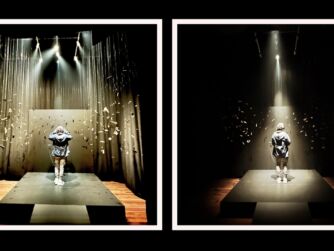Ben Kuchera talks about what it’s like to write about virtual reality when the majority of his readers haven’t been able to try VR yet. There’s still a sense that it might be all hype a bunch of vaporware up until you’re able to actually try it and believe it yourself.
 He talks about some of the technical hurdles that have come up a long the way, but that it’s amazing and incredible once you get everything working. He sees that Gear VR will be like developing for a console in that developers will have a fixed set of hardware that can provide a more consistent VR experience.
He talks about some of the technical hurdles that have come up a long the way, but that it’s amazing and incredible once you get everything working. He sees that Gear VR will be like developing for a console in that developers will have a fixed set of hardware that can provide a more consistent VR experience.
Kuchera also discusses violence in VR, and that as we get closer to real experiences that there is a reduced tendency to want to engage in extreme violence like murdering people. And that the type of experiences that tend to work very well are the ones where you feel immersed within an environment.
Some of the VR experiences that stick out to Ben include Sound Self because its so formless and relaxing. Technolust is one of the best, fully-formed environments he’s seen in VR, and he sees that Darknet & Dread Halls also work great in GearVR. He also enjoys flying around in experiences like Flying in Dreams.
One of the interesting observations that Ben had is that he likes feeling limited and weak with VR experiences because it creates more immersion of reality. He’s excited to see more subtle and smaller experiences are since that’s what he’s finding really compelling at the moment.
Right now, Virtual Reality is the worst that it’ll ever be in our lifetime, and there’s been more innovation in 2 years than the last 20 years. His kids are growing up with VR, and he’s excited to see the open problems of VR input controls be solved and how VR will continue to evolve and change us.
Theme music: “Fatality” by Tigoolio
Rough Transcript
[00:00:05.452] Kent Bye: The Voices of VR Podcast.
[00:00:11.954] Ben Kuchera: My name is Ben Kachera. I'm a senior editor at Polygon, and I've been interested in virtual reality, gosh, my whole life, from reading science fiction to doing some of the early demos in the late 80s, early 90s. It seemed like there was this first kind of wave of VR, and then everyone realized it was terrible. And then there's all these products that kind of tried to do it again and they were always a disappointment. I've played with so many displays at CES and other shows and everyone says, oh we've cracked it, we've finally done it, and no one ever has. I was lucky enough to get one of the first Oculus demos from John Carmack at QuakeCon like two years ago. And I was talking to him beforehand and I said, I've played dozens of headsets, they're always a disappointment, everyone always says that they've cracked it, and like, I'm just gonna let you know that I'm really skeptical of what you've done. And he looked at me and he was like, we've done it. And I was like, it's bold words, but when John Carmack tells you that, like his frame of reference is way higher than anyone else's. So I trusted it. So I put it on and this was the Doom 3 demo, the first thing they showed. And I remember looking around, and just, you really felt like you were there. Like, we're so spoiled with the DK2, and having played with Gear VR now, and even the Crescent Bay demo, we don't remember how much of a revelation the first dev kit was, or even the prototypes. It was so much better than anything else anyone has ever tried. So I remember looking over my shoulder and down, and seeing the little Doom 3 robot that, like, follows you around, and it looked up at me. So I'm in virtual reality looking at this robot looking at me and I was like, they've done it. So I took it off and I looked at Carmack and he was like, so? I was like, you've done it. He was like, oh, I know. And later on that evening, one of the guys there was like, oh, do you want to talk to the guys who actually did the headset? And it was Palmer and Nate. Like, this was two years ago, back when they were like, this could turn into something. So, I've been very fortunate to have been there at some of the earliest press demos. You know, I bought a DK1 off Kickstarter, I got a DK2 the second they were available and I have one at home. and I've been able to... I actually bumped into Nate on a flight to Iceland randomly, and he was like, you know, it'd be great if you didn't, like, tweet that you saw me here, because we were going to CCP FanFest. And I was like, so what are you going to do there? He's like, I can't really talk about it, but like, I'll owe you a favor if you don't talk about it. That's when they announced EVE Valkyrie, which is probably the closest we have to a AAA VR game right now. And I was one of the first people to play that. And it was just, everything I see that Oculus is doing just really gets me closer to believing that VR is actually going to happen this time. I mean, with the talent and the hardware we've seen, if they don't do it, I don't think it's ever going to happen. Like, we're so close right now.
[00:02:52.585] Kent Bye: And so as a journalist at Polygon, you've sort of been watching this unfold. And so what do you think your role is into the wider virtual reality community and to the wider gaming community?
[00:03:03.880] Ben Kuchera: It's really fascinating talking to readers who read stories about virtual reality, because the virtual reality community is one thing, and I interact with them in a bunch of ways, and I know a lot of the developers, and I know a lot of people at Oculus, and I try to stay on top of it and report on it. But when you write a story about virtual reality, what you have to understand is 99.99% of your readers have never been given the opportunity to hold an Oculus Rift. They've never been able to try it. For the majority of the tech enthusiasts out there, there's still a huge chance that this is all vapor or it's all hype. It's so hard to try to keep people's interest when they haven't had a chance to kind of see it for themselves. I think this technology, way more than even next generation consoles or a new controller or anything else, unless you've played it, unless you've tried it, you're really not going to understand what all the hype is about. And we're getting to the point where we're over two years in and we're still getting announcements of new dev kits. And you know, Gear VR is going to be the innovators edition. It's not a retail product yet. So I think people are getting really frustrated that there's nothing they can try. They can't go to a local store and put one on. There's nothing they can pre-order if they're really into it. So I think we're getting to a point where people like reading about it, but they just really want some way to go out there and see it for themselves. And I think those of us who go to these shows and are living in this space or are lucky enough to have a dev kit in our homes, we kind of lose track of how privileged we are to kind of spend time inside virtual reality and know how big of a deal it is and will likely be.
[00:04:39.497] Kent Bye: And I think one of the tricky issues with the DK2 coming out was that it was released into the wild and a bit of, as you call it, a hot mess, but that's okay. And I think that was sort of an interesting reflection of a lot of the issues in terms of the technical hurdles and all the nuanced things that people had to do to even get it running. But yet sort of that reassurance that despite all of that, it's still pretty incredible.
[00:05:05.558] Ben Kuchera: It's so funny talking to people who are playing with DK2s, whether they be developers or just enthusiasts who want to play these games, because every new demo or experience that comes out, you go through this two-hour thing, where 45 minutes to an hour and a half is just frustration. And you're like, this is bullshit, and it's such a pain in the butt, and it's so hard to get something running, and then it works. And then you're like, oh my god, this is the future. And it's like the problem with the DK2 now is literally every new release you go through this cycle of like struggling to get it to work or figuring out what grouping of settings works best for that demo. And I think that's the major opportunity for the Gear VR. It's something, you know, I've seen a ton of demos at the show and the setup is literally they turn it on and they hand it to you and you slide it on. Developers are able to develop for Gear VR as if it were a console. Everyone's using the same phone inside there. They have the exact same hardware. It's not like PCs where we're all running different GPUs with different drivers and different screens and our cameras in a different place. With this, it's so unified and I think it makes it a very welcoming, very consumer-friendly product. I'm very excited about it for that reason.
[00:06:14.896] Kent Bye: Yeah, an interesting thing about Polygon that I've noticed is that at E3 you guys did a whole supercut of all the trailers of all the violence and, you know, for me coming outside of the gaming community and I watched that and I'm like, oh my god, wow, this is certainly a lot of very bloody, violent stuff and when you cut it together like that you see that. And one of the articles that you wrote that I think is really striking to me also is, can we please stop shooting zombies in the face in virtual reality? Can we move beyond that? So I see you in Polygon as sort of like the larger conscience of trying to direct us in a certain trajectory. But when you think about those articles and what seeded that, where did that come from and where would you like to see this go?
[00:06:59.179] Ben Kuchera: I think the nice thing about VR development is I don't think it requires me or Polygon or any outlet to speak to its consciousness. In a lot of ways that article was reflecting what I've already been playing in VR. Experiences work very, very well. If you create a compelling garden where you're just looking around and you can bend down and look at a flower. I can spend a half an hour in that experience. A lot of the games that people really like in VR, if you put them on a standard screen, would be incredibly boring, or almost terrible. But once you're inside the environment, and you feel like you're there, and you can kind of relax and enjoy that, I think that's the power of VR. VR feels like you're doing something, and you're experiencing something real. And there's a disconnect because normal video games on a screen are so artificial. You're looking at a 2D image on a set screen with a controller in your hand and you push a button and do something. It's almost easier to enjoy violence in that context because you're so separated by it. If you were playing a very realistic, violent virtual reality game, it would be terrible. Like, I tell people with virtual reality, if you were given god-like powers, if you rubbed the lamp and the genie came out and said, I can grant you five wishes to do whatever you want, it would be very rare for anyone to list murder or be in a war in those five things. It would be like, I would love to explore under the sea. I would like to fly in the sky. I would like to be invisible and pass through walls. I would like to be able to, like, fly and become a dragon. Right? Like, we all have these crazy dream-like fantasies, and if we were able to do it, I don't think anyone would really wish to do violent things. No one is out there going, man, it would be really cool if in real life I could murder a bunch of people. Which is what a lot of video games are. They think, I would like to fly, I would like to be under the sea, I would like to fly spaceships and explore the stars and fly through the galaxy. So, I think VR, since it feels like you're there and you're doing these things, we're reflecting what we actually want to do. And we, as a people, don't often want to be violent. It really makes me feel good about the human spirit that as we get closer to real experiences, the violence goes down. I think that's an amazing thing that we're seeing in the heart of creativity and what people actually want to do with themselves.
[00:09:13.274] Kent Bye: And so what have been some of the more compelling virtual reality experiences that you've had then?
[00:09:17.997] Ben Kuchera: Oh gosh, there are so many. I'm a big fan of Soundself because it's so formless and it's so relaxing to me. Just that interaction of the lights and the sounds and you can hear your own voice through it. I'm a big fan of Technolust because it's one of the best fully formed environments I've seen in VR. You can walk around and you feel like you're actually in this apartment. and the action is like running from things or figuring out puzzles or trying to figure out where to go next. It's not like you get a gun in the first 30 seconds and then you're just mowing down police officers. Like when the action happens in that game, you actually feel like a normal person who is scared and trying to survive this experience, which feels more real to me and more captivating because that's how most of us would be. What else do I really like? I think DarkNet is really great. I think it works amazingly in Gear VR, actually being able to look around 360 degrees and I feel the same way about Dreadhalls. I like experiences in VR that almost make me feel limited or weak. because we have all of these power fantasies and, you know, hardcore screen-based video games, whereas it would actually be very hard to do all these things. In virtual reality, because, again, you feel like you're there, like, doing smaller things gives you a much greater sense of accomplishment because you kind of feel like you've done it. So I love the fact that experiences are getting more subtle and almost smaller-scaled. I think that's amazingly cool.
[00:10:43.184] Kent Bye: What do you think of the ultimate potential for what virtual reality could bring?
[00:10:48.017] Ben Kuchera: The thing that makes me really happy is that, you know, we're starting to see, like, I talked about flying, which is one of my fantasies, and I love playing very basic demos where you just look where you want to go and you're flying around canyons and everything. Flying in Dreams is an amazing, very small demo, but it's a really captivating experience. And it really provides you with the feeling that you're actually flying through this alien environment. It's absolutely cool. And what makes me really happy is we talk about all these games we're really enjoying playing and the new hardware we're seeing that's really cool. But when you take a step back, this is the worst virtual reality will ever be in our lifetime. We are looking at the first step into like a 50-year process. So I think we've gone through more innovation in virtual reality in the past two years than we have in the past 20. and just seeing how far we've come from DK1 to the Crescent Bay demo that we're seeing here, and thinking it's been a little over two years. Like, extrapolating that line to five years from now, to ten years from now? I mean, I have a lot of kids at home, and they're kind of growing up with virtual reality headsets in the house. It's not a strange thing for them. They live in a world where virtual reality is a thing that they get to have fun with and play games in. And that really excites me, that for the next generation, this is just going to be another art form, another form of technology that lets them explore their imaginations.
[00:12:10.835] Kent Bye: And is there anything else that's left unsaid that you'd like to say?
[00:12:14.357] Ben Kuchera: we need a 3D controller. The fact that we don't have a way to actually see your hands and to reach in and pick something up and explore it with six degrees of freedom, move it in and out and twist it around your eyes to really explore an object, I think that is a huge missed opportunity. I think we're seeing things like the STEM system that are going to get close. I have no reason to doubt that Oculus themselves probably have something really great in the lab that they're probably going to release or announce at some point. So, that's the one area I think we need work on. I think dedicated, you know, 3D positionally tracked controllers are something that is mandatory for a great VR experience. Great. Well, thank you. Thank you so much for having me.




